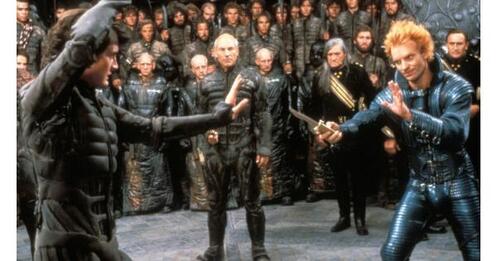D+ | A young duke with a prophetic destiny is targeted by the universe's most powerful forces. Directed by David Lynch Starring Kyle MacLachlan, Francesca Annis, and Sting Review by Jon Kissel |

The hail of negative bullets isn’t the best criticism but so many bad choices demand calling out. Madsen’s opening narration immediately starts the cringe by providing too much information. Just call the emperor the Emperor, instead of the Padishah Emperor Shaddam IV. Don’t name the spice mélange, just call it spice. This continues later with useless details like the CHOAM contract that determines who mines spice on Arrakis. Just call it a contract and spare the actor’s dignity. The Emperor’s (Jose Ferrer) throne room looks tacky, as opposed to the headquarters of the most powerful man in the known universe. There’s everyday dogs running around in it, a trend that continues with the Atreides’ pug that Duke Leto (Jurgen Prochnow) insists on holding during official receptions. Lynch includes the internal monologues of many characters, but their thoughts are never revealing and the same sentiment could be implied by a look and interpreted by any conscious viewer. Paul’s (Lynch favorite Kyle MacLachlan) dreams, the place where Lynch should’ve shone, are more literal prophecies and are punctuated by sleeping Paul speaking clearly in proper nouns. So far, we’re about 15 minutes in.
The many, many flaws of the film could be somewhat overlooked if the story was capable of any kind of coherence or attachment. Star Wars has its share of annoyances, but the root plot is recognizable. Dune’s core story is a New Testament allegory with Arrakis and spice as the vehicle for the messiah’s emergence, but Lynch’s Dune can only tell the shortened and compacted version of that familiar arc. Villeneuve’s Dune will wisely split Herbert’s book into two halves, but Lynch gives 75% of his runtime to getting Paul with the Fremen natives of Dune and 25% to their combined taking over of Arrakis from the evil Harkonnens (more on them later). The more luxurious first part still feels shorthanded and poorly fleshed out, so the second half cannot help but rely on chosen-one tropes to keep things moving. Paul not only learns the Fremen customs in a quick series of time-lapse cuts, but he becomes the greatest Fremen that ever was while also teaching them the absurd weirding way, a style of voice-activated shooting that made me feel sympathy not for the characters, but for the actors. He and Chani (Sean Young) fall in love without understanding anything of her character. Paul ‘conquers the worm’ (just in time for No Nut November) on his first attempt. There’s no time for trial and error or even a montage of gradual improvement. As the film races towards its ending, catharsis happens so quickly that it leaves the specifics of it out, such that Baron Harkonnen’s (Kenneth McMillan) flying into a sandworm’s maw or Feyd Rautha (Sting) getting a knife vertically through his head are undercut by the viewer having no idea how or why either thing happened. Villeneuve will get a feature-length crack at Paul with the Fremen and whatever comes after, but I don’t feel spoiled at all by watching Lynch’s complete story. It leaves the viewer with the barest of senses of what’s going to happen, and sweeps the details under the rug.
The only place that Lynch is coming close to success is with the Harkonnens. So many other characters, like Paul’s mother Jessica (Francesca Annis) or Chani or the Emperor or the completely wasted Duncan Idaho (Richard Jordan), are total misfires. That’s not to say the Harkonnens aren’t poorly characterized as villains, or uncomfortably homophobic in the way the Baron, a singularly repulsive character, leers at servants or Feyd. They at least evoke a reaction, albeit one of wholesale revulsion. Lynch’s envisioning of them as debaucherous cretins whose wealth puts them beyond social niceties is a take in a film that otherwise has none. The navigators are appropriately weird Cronenberg-esque creations, and I smiled at every shot of their pulsating sphincters. I will also credit Lynch with one good casting choice in Patrick Stewart as Gurney Hallack, whose reunion with Paul was the only time I felt anything other than bafflement. The sign of a good actor is the ability to elevate bad material. Patrick Stewart’s a good actor.
David Lynch is one of the most revered filmmakers of the last forty years, and even he is capable of making something as execrable as Dune. While there exists some minority that praise this as a cult classic, I just don’t see it. This varies between the level of a high school play, and a high school play with a very high production budget. Lynch is ashamed of it, and who am I to argue with him. D
 RSS Feed
RSS Feed